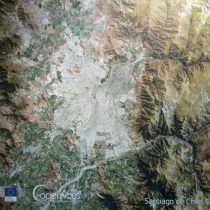
When today each reader can distinguish up to the neighborhood of the commune where he resides or works and even expand and approximate it, obtain details of his particular interest, in a good satellite image – in the species, Santiago, captured by the Sentinel-2A satellite, from the European Earth Observation Programme COPERNICUS, in April 2016 – the strategic need for the allocation of important financial and human resources, for the peaceful use of the cosmos, outer space, for the sake of the national development of our society and the better and safe living of our citizens and our citizens should no longer be discussed.
That is why having a National Space Policy is a priority and urgent need for Chile, for several decades now, as early as the end of the twentieth century, and, slowly, the last governments have been developing some proposals with content, to advance that. Most recently, President Piñera, on Tuesday, October 13, 2020, “presented the National Satellite System (SNS), a key pillar for materializing Chile’s ambitious Space Program,” detailing its nine major implementation milestones, as required by the information officially provided by the Ministry of Defense (Mindef), revealing a questionable new approach, maintaining a strategic, civil institutional deficit.
This confirms the urgent need to re-have a Chilean Space Agency (ACE), which, established as a Presidential Advisory Commission, on 17 July 2001, by Decree No. 338, it was developed, installed in the then existing Undersecretariat of Aviation, of the Mindef, but with a president and executive secretary civilians, and, over the years, and as a result of bad governmental and ministerial decisions, it was shrinking and thus disappearing, and already denatured and without resources, around 2009-2011. When the ACE started its activities, I described, detailed and highly valued it at El Mostrador on October 2, 2001.
Then, in 2014, the Committee of Ministers for Space Development was established, co-established in the Undersecretariat for Telecommunications (Undertel), the TTT, until March 2018, without great propositive action, with sporadic meetings, diminished operation, and with bureaucratic and unprecedented limitations in order to implement international space cooperation agreements. The most emblematic case was the delay of more than a year in deciding who would sign, for Chile, the so-called Cooperation Agreement with the European Commission and its COPERNICUS Programme. Finally, with the Undersecretary of Telecommunications, we had to travel to Sao Paulo for signature, on Thursday, March 8, 2018, in a joint ceremony, during the signing of the Arrangements with Brazil and with Colombia.
By contrast, our neighbouring countries, and the remaining ones in South America, and some others in Latin America and the Caribbean, had continued to advance their respective space developments, always sorry for adequate institutionality, dedicated and specialized, with highly prepared human resources and sufficient financial resources. All this has resulted in these countries having an ad hoc agency, some with another name, such as commission, responsible for this strategic area in all national and scientific development.
To the well-known and solid, old-fashioned ventures of Argentina, Brazil and Mexico, they can be added, and stand out, institutionalities created as early as the 21st century: the Bolivarian Agency for Space Activities (ABAE) and the Bolivian Space Agency (EBA), as the most consistent, with continuous existence, with adequate budgets and excellent results that, in the first case, results in having already, in orbit, 3 satellites of its own, and the other case, with a satellite in orbit, the Tupac Katari, and a second in full programming. And all this, despite and / or in the context of their respective internal problems, as two countries in search of a growing strategic autonomy, with their scientific, spatial and technological developments, to strengthen their independences and sovereignty. By the way, in Chile, once again, little is known, these experiences are not highlighted or disseminated, even if one of them is from a neighbouring country.
Thus, some preventions will be understood to be very important, in this Government and the next. In essence, contemporary space development requires inserting into the world, based on international cooperation, with cardinals being the links that are searched, contested, and selected, rightly so. An interlocution of cooperation and integration, a priority regional and subregional, but open, in the space sphere, to distant partners, geographically, with a pioneering or new but recognized experience, is essential. Such contacts shall be provided, and shall be reliable, between peers and interagences. CELAC has made a valuable contribution, under the current Pro Tempore Presidency of Mexico, in opening the accession to the signing of a Declaration of Constitution of a Regional Mechanism for Cooperation in the Space Field, as a first step towards the creation of a Latin American Space Agency.
A second prevention, of state and government management and responsibility, is that a National Space Policy – this is the appropriate context and denomination – should never be considered alien and/or distant from our Foreign Policy and also from our Defence and Security Policy. Without such omnicomprehension, efforts can be abandoned, aborted, interrupted and/or undervalued, as it has been, so far in national life. And already at the beginning of the third decade of this 21st century, everything spatial must be embedded in a Scientific, Technological, Knowledge and Innovation Policy, even more so when now, at last, we have an ad hoc Ministry, even if it is still confined to uncomfortable and small offices, and already faced with unacceptable reductions in its budget by 2021.
From my panoramic view, and with the experience of having been a co-corredactor, together with Jean-Luc Devynck, my counterpart in Paris, of the first “Framework Agreement for Cooperation in the Field of Space Technologies and their Applications”, with the Centre National d’Etedes Spatiales (CNES), signed by the President of the ACE, Nelson Hadad Heresy, and by cnES President Alain Bensoussan, in the XII FIDAE, on Wednesday, April 3, 2002, and, in addition to my efforts in Brussels, almost two years, to reach that signing of the COPERNICUS Agreement, one last responsible prevention is that the continuity, implementation and follow-up of written and subscribed texts will be cardinal, so that they do not become dead letter.
Thus, together with the strategic Agreement with the European Commission, the Subtel signed an Agreement – for these essential operational purposes, which are granting international trust, credibility and management – with the University of Chile, on Friday, March 9, 2018, as the last act of support for space development, by the Government of President Bachelet Jeria, which was anticipatory and beneficial, to this day, thanks to the open, free and complete access to all the data and data from its constellation of 6 SENTINEL satellite families, and its on-site measurement services, with sensors (terrestrial, air and sea) in six thematic areas.
The risks of the current Government’s choice in this sensitive area, in seeking a contractual link with Israel, are very serious. Small country in population, but with a huge and sophisticated scientific, spatial and technological development, essentially oriented to its aggressive military objectives against its neighboring countries of the Middle East and the inalienable rights of the people of Palestine, to intelligence and monitoring its process of colonization and occupation of territories, condemned by the United Nations, repeatedly. In addition, the second largest Palestinian community in South America resides in Chile. Impacts on the country image will be lacerating, in the South American subregion and in the Latin American and Caribbean region, by reacting to links with Israel.
Also, risks to our national independence and sovereignty, in the space sphere, are enormous. In these matters nothing is random, and they are not for the inept and the innocent. Even these Israeli “tourists”, discovered in strange ‘excursions’ in Torres del Paine and Patagonia, coincidentally, were all always linked, via GPS, to scientific, Jewish and Zionist centers and entities.
And, it will be very risky for the strategic relationship of our National Space Policy, with our Foreign Policy and our Defense and Security Policy, which I have postulated as very paramount, from the point of its principles and values, in particular in the search for a Globalization of Decency, in which the State of Israel repudiates, in the current so-called international community, and for the objective of building a multipolar world.
Finally, I recall that in my article “Russia and FACh”, published in El Mercurio, on Friday, September 9, as early as 1994, on its page A2, I wrote: “The creation of a Chilean space agency, specialized and open to the highest technology in this field, is a national and state need”. Continue with this estr deficitatégico, in 2021, will be a bad decision for Chile, and worse news, regrettable, for the members, specialists and stakeholders of the revived Chilean Association of Space (ACHIDE), chaired by Mr. Héctor Gutiérrez Méndez, who was a very selfless executive secretary of that remembered ACE. Much coherence, consequence, continuity and perseverance, in the field of Space Development, for Chile, are and will be crucial.
For all of the above, this agreement negotiated with Israel for this new elected approach to a “National Satellite System” should be fully revised and/or clearly challenged in the relevant parliamentary-legislative instance and opportunity, as well as by political parties and by organizations defending life and the day-to-day validity of human rights, throughout our territory, and with our outer space. Satellite images of Israelite origin will not escape strong condemnation public scrutiny. And already the Fasat Charlie, something tired, observes us, summons us and demands better criteria, not dissatisfied, and a great political will.
The content poured into this opinion column is the sole responsibility of its author, and does not necessarily reflect the editorial line or position of El Mostrador.





